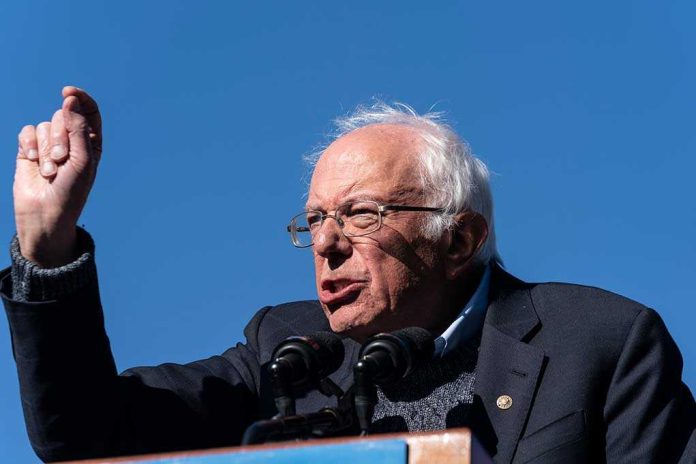
Bernie Sanders’s public critique of Kamala Harris’s 2024 campaign strategy underscores the deep-seated ideological rifts within the Democratic Party.
Story Highlights
- Sanders blames Harris’s campaign strategy for Trump’s 2024 victory.
- Harris’s focus on wealthy donors over working-class issues is criticized.
- The Democratic Party faces internal debates over future electoral strategies.
- Sanders’s comments reveal divisions within the party.
Sanders’s Critique of Harris’s Campaign
Bernie Sanders has never been one to hold back his opinions, and his recent remarks about Kamala Harris’s 2024 presidential campaign are no exception. Sanders, appearing on ‘The Tim Dillon Show,’ lambasted Harris for what he saw as a campaign disconnected from the economic realities of working-class Americans. He argued that her reliance on wealthy donors at the expense of addressing pressing economic issues allowed Donald Trump to win the presidency once again. His comments have reignited debates within the Democratic Party about its strategic direction.
Bernie Sanders Nukes Kamala Harris Over Lackluster Campaign: 'Allowed Trump to Win' https://t.co/tLBW5MK0WU
— Mediaite (@Mediaite) October 22, 2025
Harris’s campaign, which struggled to win over key battleground states, has been criticized by Sanders for failing to prioritize the economic concerns of everyday Americans. Sanders, who has long championed economic populism, believes that the Democratic Party must shift its focus from donor-driven politics to working-class issues to regain electoral competitiveness. His critique is particularly poignant coming from a prominent figure within Harris’s own party, highlighting significant intra-party divisions over strategy and priorities.
Timeline of Events Leading to Criticism
The 2024 U.S. presidential election was a turbulent affair, marked by President Joe Biden’s late withdrawal from the race due to health concerns and declining poll numbers. This sudden exit left Kamala Harris as the presumptive Democratic nominee under a cloud of intense pressure and scrutiny. Sanders, who endorsed Harris in July 2024, urged her to focus on working-class issues, a plea that seemingly went unheeded. By November 4, 2024, Harris had lost the election to Donald Trump, a defeat that many, including Sanders, attribute to her campaign’s strategic missteps.
In October 2025, Sanders’s criticism resurfaced during media interviews and podcast appearances, coinciding with the release of Harris’s memoir. In her book, Harris reflects on the campaign and election loss, acknowledging that economic issues played a crucial role. Yet, Sanders’s pointed remarks have pressed the Democratic Party to confront its strategic missteps and reassess its priorities as it looks towards future elections.
Impact on Democratic Party Strategy
The fallout from Sanders’s critique extends beyond mere words, potentially influencing the Democratic Party’s future direction and strategy. In the short term, his comments have renewed intra-party debates over messaging and electoral strategy, with potential shifts in Democratic leadership and campaign tactics on the horizon. In the long term, Sanders’s insistence on prioritizing working-class issues could lead to a realignment of party priorities toward economic populism, with significant implications for the party’s identity and its 2028 presidential contenders.
The Democratic Party’s internal review and strategic planning efforts are already underway, with a renewed focus on economic messaging. This shift comes amid ongoing debates over inflation, economic uncertainty, and a polarized electorate. The Republican Party, led by Trump, successfully capitalized on these economic fears, positioning itself as a champion of the working class, a strategy the Democrats are now compelled to counter.
Expert Opinions and Analysis
Political analysts and strategists have echoed Sanders’s concerns, arguing that the Democratic Party’s failure to address economic anxieties contributed to its electoral losses. Notable figures like James Carville have pointed out that neglecting working-class voters in favor of a more elite coalition was a costly mistake. Meanwhile, academic studies, including research from Tufts University, confirm that economic issues were paramount for many voters, particularly the youth.
As the Democratic Party grapples with its future, diverse viewpoints emerge. Some party leaders maintain that social issues remain critical for mobilizing key constituencies, while others contend that a focus on economic messaging is essential for winning back swing states. What remains clear is that Sanders’s critique has sparked a necessary conversation about the party’s priorities and strategy, one that could shape its electoral fortunes for years to come.




